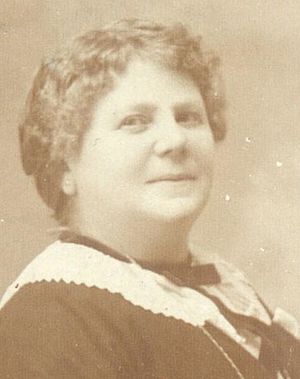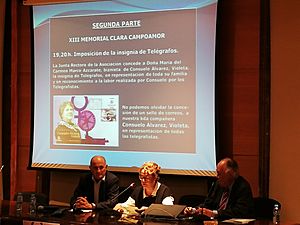Consuelo Álvarez Pool facts for kids
Consuelo Álvarez Pool (born in Barcelona, Spain, on July 24, 1867 – died in Madrid, Spain, on January 19, 1959) was a very important Spanish woman. She was a writer, journalist, and politician. She was also a suffragist, which means she worked hard for women to get the right to vote. She was a feminist, believing in equal rights for women and men. People often knew her by her special pen name, "Violeta." She was one of the first women to work as a telegrapher in Spain.
Contents
Consuelo Álvarez Pool's Career
Becoming a Telegrapher
Consuelo Álvarez Pool went to the School of Telegraphs. This school was started by a group called the "Association for the Education of Women." Students there learned for two years to become telegraphers. A telegrapher's job was to send and receive messages using morse code in telegraph offices.
When Consuelo was 17, her father passed away. Her family faced tough times. She decided she wanted to earn her own money and be independent. So, she studied to join the Telegraph Corps. On April 15, 1885, she passed the test to become a temporary assistant. This was a big deal because it was one of the first times single women over 16 could take this exam. She started working with international messages because she spoke several languages. Another famous Spanish feminist, Clara Campoamor, also became a telegrapher that year.
Consuelo worked as a telegrapher until she retired at 65. She was in charge of the press office for the Telegraphs department, which started in 1915. She also represented workers in the Telegraphers' Union. She helped create a special engineering school for telecommunications.
In 2018, a special stamp was made to honor women telegraphers, featuring Consuelo Álvarez Pool, "Violeta." It was released in 2019. Her great-granddaughter received an award recognizing Consuelo's important work for women telegraphers.
Working as a Journalist
Consuelo started writing for newspapers in Oviedo, a city she moved to. Later, she moved to Madrid and got a full-time job at a newspaper called El País. She was asked to write about "women's issues," like fashion, cooking, and home life. This is when she started using her pen name, Violeta.
But under the name Violeta, she wrote about much more important topics. She wrote about the right to divorce, women's right to education, and equal pay for women. She also wrote about improving prisons and supporting working-class people. She spoke out for fair treatment for women.
Consuelo believed it was important to write about the difficulties and poverty she saw. She thought the press should do more than just report news. She said, "The mission of the press is not just to write about important events, but also to teach, guide, and bring about change."
Today, Consuelo Álvarez, Violeta, is known as one of the first women journalists in Spain. She joined the Madrid Press Association in 1907. She was one of the first two women journalists to get a professional press card.
Consuelo Álvarez Pool's Activism
Fighting for Rights
Consuelo strongly believed that women should have access to education. She thought this would help them become financially independent. This way, women wouldn't have to rely only on marriage for their survival. She also spoke and wrote about the right to divorce. This was a very new and debated idea at the time. Other women, like Carmen de Burgos and her own daughter Esther Azcaráte Álvarez, joined her in this fight.
Consuelo also had strong views about separating religion from government and public life. She shared these ideas in her writings, speeches, and public meetings. For example, she spoke at a feminist meeting in Madrid in 1910. In 1931, she gave a speech about how religion and money were connected in society.
Political and Cultural Life
Consuelo was very active in cultural groups. She was a member of the Ateneo de Madrid from 1907 to 1936. Here, she gave speeches and took part in literary discussions. She wrote many letters to other writers and politicians throughout her life. Some of her famous friends included Benito Pérez Galdós and Miguel de Unamuno.
She was also very involved in politics. In the 1931 elections in Madrid, she ran as a candidate for the Federal Democratic Republican Party. She worked with her friend Clara Campoamor to defend women's right to vote.
Consuelo Álvarez Pool was also part of a group called Freemasonry.
During the Spanish Civil War, Consuelo faced difficulties because of her strong opinions. She was accused of being a Freemason. Even at 77 years old and in poor health, she was sentenced to 12 years in prison. However, due to her age and health, she served her sentence under special conditions.
Consuelo Álvarez Pool's Writings
Consuelo was part of a group of writers known as the Generation of '98. This group included other important women writers like Emilia Pardo Bazán. Her work was recognized by literary critics.
Stories
- 1900: La Pasionaria, La medalla de la Virgen, Las Amapolas, El Ramo de Claveles, El Primer Vals, and Hojas caídas.
- Cuentos de "El País" (Stories from "El País"). Many of these stories featured women as the main characters.
- Stories published in the revista La Vida Socialista.
Poetry
Most of her poems appeared in the newspapers where she worked.
- 12 poems in El Progreso de Asturias (1902-1903), often about love.
- 14 poems collected in El País (1909-1919).
- One poem in Vida Socialista.
Literary Criticism
She wrote reviews of other authors' works.
- Monógrafos oratorios by Mariano Aramburu Machado
- El huerto de Epiceto by Antonio Zozaya.
Articles on Social Life and Travel
She wrote many articles about her travels and observations of society.
- Impresiones de un viaje (Impressions of a Journey) (1907)
- Catalanas (Women from Catalonia) (1909–1910)
- Veraniegas (Summer Stories) (1911)
- Santanderinas, Aldeanas y Viajeras (Women from Santander, Villagers, and Travelers) (1912)
- Alicantinas (Women from Alicante) (1913)
- Viajeras (Travelers) (1913)
- Por tierras gallegas (Through Galician Lands) (1916)
Literary Introductions
She wrote introductions for other authors' books.
- Modulaciones by Manuel Camacho Beneytez (1914)
- ¡Mujeres! Siluetas femeninas by Juan García Cobacho (1930)
Translations from French
- Los amores de Gambetta (The Loves of Gambetta)
Novels
- La Casona del Pinar. This novel was partly about her own life. It tells the story of three generations of a family.
Images for kids
See also
 In Spanish: Consuelo Álvarez Pool para niños
In Spanish: Consuelo Álvarez Pool para niños




